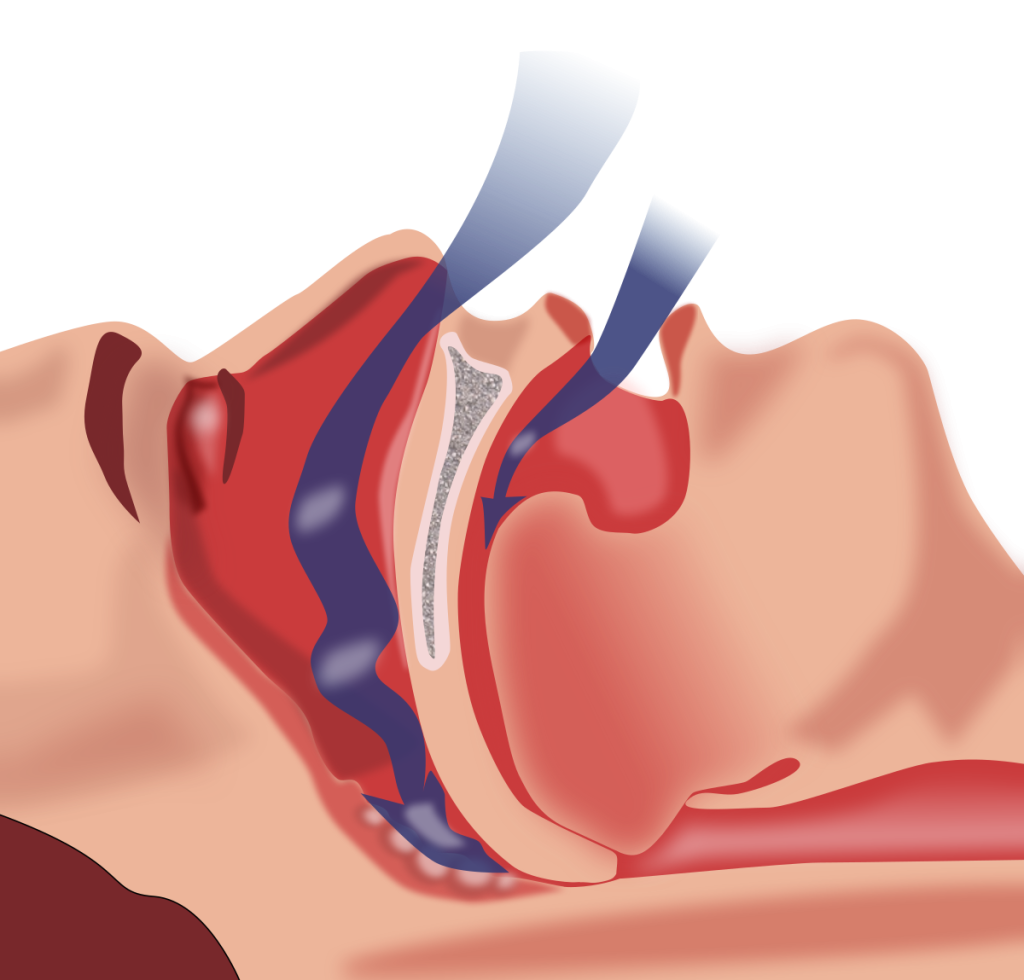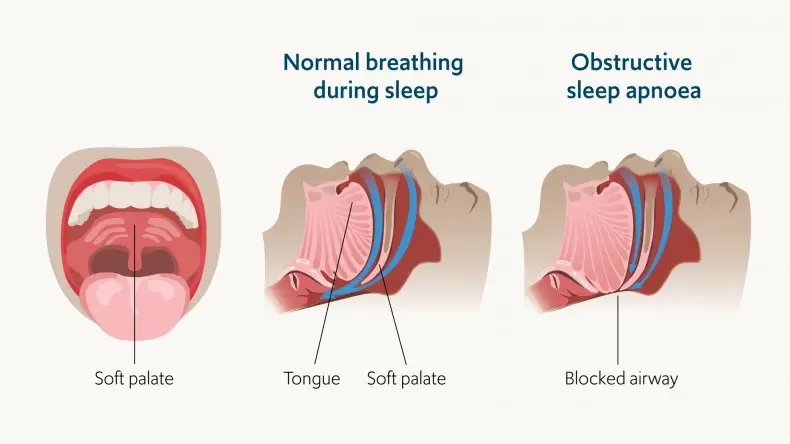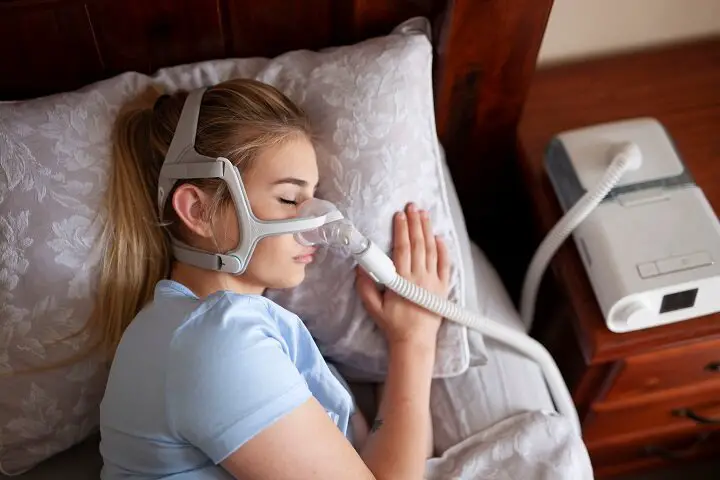When you or someone you love suffers from OSA, you feel the need to learn everything there is to know about this affection. What’s the first thing you need to find out? Well, when my husband experienced OSA symptoms for the first time, we began to ask around about sleep apnea causes. One of the main steps in cutting an affection is to put your finger on the main cause and try to remove that factor. Sleep apnea may occur spontaneously for different reasons, and the purpose of this article is to discuss all these factors.
First of all, it’s essential to understand the definition of this condition. Obstructive sleep apnea (OSA) is characterized by episodes of a complete (apnea) or partial collapse (hypopnea) of the upper airway with an associated decrease in oxygen saturation or arousal from sleep (National Library of Medicine). This disturbance results in fragmented, nonrestorative sleep.
The term “apnea” derives from the ancient Greek word “breathless” (Gr. Apnous), describing the temporary suspension of breathing during sleep.

Sleep Apnea Causes
When the muscles from the back of your throat relax, they narrow or close the airway you breathe. These muscles support your soft palate, the uvula (the triangular piece of tissue hanging from the soft palate), the tonsils, the side walls of the throat, and the tongue, and when they relax, obstructive sleep apnea happens.
Therefore, if your brain senses you can’t get enough air, which can lower the oxygen level in your blood, it will briefly wake you up for your own safety. However, these episodes are usually so brief that you aren’t able to remember them, and they tend to repeat 5 to 30 times each hour, all night. You might snort, choke, or gasp. Finally, this repetitive process makes it hard for you to reach deep, restful sleep, and you’ll notice a lack of energy during the day.
Risk Factors for Sleep Apnea
Like in any other health condition, certain factors significantly increase the risk of obstructive sleep apnea. The main factors are excessive weight, narrowed upper airway, large neck circumference, age, sex (men who are older than 60 are twice as likely to develop sleep apnea), alcohol consumption, smoking, and high blood pressure.
Therefore, let’s discuss a little about these risk factors:
- Having family members with sleep apnea might increase your risk of developing OSA too.
- Why do excess weight and obesity greatly increase the risk of OSA? Well, fat deposits around your upper airway can obstruct your breathing.
- Next, when it comes to neck circumference, just imagine that a thicker neck also means narrower airways. That makes sense, right?
- Also, if you have a narrowed airway (no matter the cause: inherited narrowed throat, tonsils, or adenoids), it’s also problematic, especially when it comes to kids.
- The use of alcohol, sedatives, or tranquilizers relaxes the muscles in your throat, which can worsen your obstructive sleep apnea condition.
- Smoking can increase inflammation and fluid retention in the upper airway. So, if you haven’t already had enough reasons to quit smoking, this is your sign!
- If you suffer from nose congestion and have trouble breathing through your nose, no matter the cause, you’re more likely to develop obstructive sleep apnea.
- Men are 2 to 3 times more likely to have sleep apnea than women. However, menopause increases the risk of developing sleep apnea in women, too.
- Moreover, sleep apnea occurs significantly more often in older adults.
- Congestive heart failure, high blood pressure, polycystic ovary syndrome, chronic lung diseases such as asthma, and type 2 diabetes are some of the conditions that may also increase the risk of developing obstructive sleep apnea.

Main Symptoms of OSA
Now that you know everything there is to know about the causes of sleep apnea, it is equally important to understand what the main symptoms of this condition are. Considering the complications that sleep apnea can cause, it’s not something that you can overlook. So, if you experience some of these symptoms, you should consider seeing a doctor.
So, some of the most common symptoms of suffering from sleep apnea include sudden awakening (usually caused by an asphyxiation sensation or by a feeling of shortness of breath), restless sleep, and sleeplessness. Most people who suffer from OSA tend to also face a lack of energy during the day.
Finally, you can also test if you suffer from sleep apnea at home with the help of specialized apnea screening devices. These testing devices for home diagnostics have become increasingly popular due to their compact size and precision. These portable monitors record and analyze the sleeper’s breathing, including sleep apnea events, snoring, and blood oxygen saturation.
When To See A Doctor?
Discussing sleep apnea symptoms with your doctor so you can be correctly diagnosed and treated can improve your quality of life. It’s not recommended in this situation to treat yourself without consulting a specialist. OSA is tied to other chronic health conditions, including underlying coronary disease and cardiovascular risk factors such as diabetes, hypertension, and heart failure. So, if you suffered from any of those conditions and have also been facing OSA symptoms for some time now, you should certainly discuss it with a specialist.

How to Avoid Sleep Apnea Causes
All in all, I really hope the above guidance and advice helped you find out more about the causes of sleep apnea and its main symptoms. I really can’t stress enough the need to learn more about this condition if you or someone you love suffers from it. Believe it or not, it can really influence your way of life if you don’t treat it properly. However, if you have extra curiosities, the Internet is a great source of information! So, please don’t stop here, and remember, you can always see a specialist for treatment and further, more personal questions.
There are a number of helpful modern devices for helping with sleep apnea, such as an Anti-Snoring Mouthpiece or a Sleep Apnea Pillow.
Finally, I’m aware of how difficult it is to cope with the discomfort, as my husband has suffered from OSA for some time now. We’re still figuring out what would be the best solution for him after discussing it with some specialists and considering more options. So don’t worry if you haven’t found any solutions yet! Only learning about the causes of sleep apnea is a step forward in figuring it out! Last but not least, if you heard about Inspire sleep apnea treatment and want to find out more, don’t hesitate to read my latest article on the subject.
